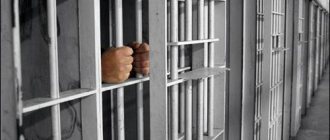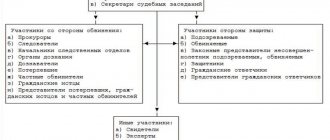What is the type of correctional facility?
A correctional institution is usually understood as the place where those sentenced to imprisonment serve their sentences..
Punishment in the form of restriction of freedom is imposed by the court for the commission of crimes of minor and medium gravity, as well as for grave and especially grave criminal acts.
The crimes included in the above categories differ in nature and degree of danger to society.
Convicts also differ in their moral, social and psychological qualities. In other words, they exhibit varying degrees of negative deviation from accepted social norms in their views, worldview, beliefs, skills, in their assessment of their personality and attitude towards other citizens, in their understanding of what is permitted and prohibited and other social values.
That is why there is a need to differentiate convicts who differ from each other in the methods of committing crimes, in goals, motives, the object of the attack, etc.
The activities of correctional institutions are regulated by the Criminal Executive Code, Law No. 5473-1 and other regulations.
Educational colonies
These correctional institutions house juvenile offenders, the punishment for which is imprisonment. In the existing system of correctional institutions in our country, such colonies are called upon to solve special problems. Their purpose is to return minors to the path of respect for the rule of law established in society.
Juvenile criminals who have received one or another term of imprisonment as punishment are sent to educational colonies. The internal regulations of such correctional institutions allow the creation of separate isolated areas on their territory where convicts who turned eighteen years old while serving their sentence are kept.
In educational colonies, as in all other penal colonies, various conditions are established for prisoners. They can be ordinary, lightweight, preferential and strict. What distinguishes them is the severity of their regimes.
Those teenagers who are serving the sentences assigned to them by the court under normal conditions live in dormitories. They are allowed a monthly expenditure of personal money within certain limits, as well as 6 short-term and 2 long-term visits per year.
A more lenient regime for those serving sentences in lighter conditions. They have a higher monthly personal expenditure and a larger number of scheduled dates.
Under preferential conditions, convicts are given the right to live in hostels without security outside the educational zone. Supervision over such persons is carried out only by the administration of the colony. Such juvenile offenders have the right to wear civilian clothes, unlimited spending of their own funds and short-term visits in any quantity.
Those who are kept in strict conditions live in an isolated room, where they are obliged to stay during their free time from work or study.
Purpose of correctional institutions
The correctional institution is assigned specific tasks to implement the norms of penal legislation specified in Part 2 of Art. 9 PEC.
The main ones concern:
- the established regime for serving the sentence;
- carrying out educational work with prisoners;
- organization of socially useful work;
- prisoners receiving general and vocational education;
- methods of social influence.
The key task of the Russian penitentiary institution is to ensure the serving regime . To implement this, correctional institutions keep records of convicts (in the prescribed manner), distribute them among units and labor facilities, control the behavior of convicts and personnel working with them, and maintain the necessary level of isolation from the outside world and from other groups of convicts.
In order to ensure order, measures are taken to maintain the discipline of convicts, to apply incentives and disciplinary sanctions to them. Corrective action is also aimed at instilling in convicts respect for law and order in places of deprivation of liberty.
Organizing the work of convicts is one of the primary tasks of correctional institutions . Prisoners are recruited to work taking into account their gender, age, health status, ability to work, and sometimes taking into account their specialty.
They work in the production workshops of correctional institutions, at federal state-owned enterprises of a unitary nature, or are involved in the economic maintenance of the correctional institutions in which they are located.
The task of carrying out educational work with prisoners is realized through propaganda events, cultural and sports work.
It is mandatory to conduct individual conversations with convicts based on studying the personality of each of them and using psychological and pedagogical methods of influence. Religious instruction and education has an educational effect on prisoners.
To solve educational and professional problems, a network of educational organizations has been created in the educational institution . The training of convicts in educational colonies is carried out especially intensively.
The construction of an information management system is influenced by political, socio-economic and spiritual factors. These include indicators of the criminal legal, demographic and correctional characteristics of convicts.
According to the norms of international acts and penal legislation, correctional institutions implement the principle of differentiated detention of prisoners depending on age and gender, the nature and degree of danger of the act committed, the term of punishment and the presence or absence of previously committed acts.
It is considered necessary to isolate some convicts and separate detention of a number of categories (for example, convicts serving a life sentence, juvenile offenders, those convicted of particularly dangerous recidivism, etc.).
Thus, on the one hand, correctional institutions of different types have been created, on the other hand, in a penitentiary institution of the same type, different categories of convicts serve their sentences separately, which makes it possible to exert a corrective influence on prisoners in different ways, take into account the severity and nature of the committed act, the personality of the criminal, and trace the dynamics its changes in the process of serving the sentence.
Procedure for serving the term
In prisons, prisoners are kept in common areas. The exception is patients with infectious diseases, who, for the purposes of sanitary and epidemiological well-being, must be kept in separate boxes and wards.
The daily routine in such an institution involves regular therapeutic and diagnostic measures . Moreover, with the exception of the latter, it practically does not differ from the conditions of stay in a regular correctional colony.
Prisoners in prisons must undergo proper treatment. If a prisoner refuses to undergo treatment, sanctions may be applied. For example, they may be placed in a punishment cell.
The possibility of placing a patient in a punishment cell depends directly on his state of health. At the same time, medical contraindications for this are taken into account. While in the punishment cell, the patient must receive all necessary treatment.
Prisoners serving their sentences in a penitentiary institution may be required to work on a general basis. However, this is only possible according to the decision of the attending physician. If the state of health of a convicted person does not allow him to work, then it is simply impossible to attract him to this or that work.
As for the regime of detention, it is different for different prisoners. The regime of detention in a penitentiary institution depends on the regime of the convicted person in the correctional institution from which he arrived. Conditions of detention determine, first of all, the volume of prisoner parcels received, as well as the number of permissible visits.
In practice, this means that some prisoners may, for example, have more visits, while others may have significantly fewer.
When deciding whether to organize a visit, the health status of the convicted person is taken into account. If for one reason or another a visit is impossible, the prisoner is denied it. If the reasons why a meeting with relatives was impossible are eliminated, the convicted person has the right to a meeting on a general basis.
It is also useful to read: Colony-settlement
Types of correctional institutions in the Russian Federation
In Russia, there are several types of correctional institutions to which prisoners deprived of their liberty by a court decision are sent. Let's look at each of them further.
Pre-trial detention center
This is the name of the pre-trial detention center, which houses prisoners and, in some cases, prisoners serving sentences of up to six months and those who have received punishment for the first time.
Also, if the article allows, prisoners who have expressed a desire to serve their sentences here and do chores are left in the pre-trial detention center.
Correctional colonies
These institutions come in several types:
- Colony-settlement . Convicts who have committed minor acts or crimes through negligence, as well as prisoners who were transferred from other correctional institutions by court decision, serve their sentences here.
- General mode IR. These institutions house prisoners who have committed serious crimes, repeat offenders, and those transferred from children's correctional institutions (once they reach the age of 18 or 21).
- Maximum security correctional colony. In such institutions, those convicted of serious crimes serve their sentences, often with recidivism; persons transferred from a penal colony with a less stringent regime for violating conditions of detention; criminals who received life sentences.
- Prisons. Men with sentences of more than 5 years serve their sentences here, as well as criminals transferred from colonies for constant violation of the regime. Convicted women and criminals sentenced to serve life sentences are not kept in prisons.
- Medical correctional institutions. They contain sick prisoners who need compulsory psychiatric treatment, according to a court verdict, and treatment of chronic diseases.
- Age-related PSs of different types. Juvenile offenders are kept in such institutions. Here they not only work, but also receive education (secondary and special secondary).
IUs of all types do not contain together:
- adult and juvenile prisoners;
- men and women;
- sentenced to life along with those sentenced to other terms of imprisonment.
Separate correctional facilities are provided for prisoners who previously worked in law enforcement agencies.
Basic provisions and concepts of a medical institution
In 2022, the criminal correctional system organized medical and preventive institutions for medical care of convicts.
These include the following:
- Hospitals.
- Specialized psychiatric and tuberculosis hospitals.
- Institutions for the protection of motherhood and childhood (orphanages, maternity wards, dairy kitchens).
- Institutions of a special type (Central bacteriological laboratory for the diagnosis of tuberculosis and regional bacteriological laboratories for the diagnosis of tuberculosis).
- Outpatient clinics (medical units of a pretrial detention center of a correctional colony, a prison of an educational colony, a medical correctional institution, medical units of a pretrial detention center, a prison of an educational colony of a medical and preventive institution).
- For the maintenance and outpatient treatment of convicts who suffer from an open form of tuberculosis, alcoholism and drug addiction.
Purpose of the type of correctional institution
The assignment of a type of correctional facility to convicts is regulated by Art. 58 of the Criminal Code of the Russian Federation, according to which serving a sentence in the form of restriction of freedom is assigned:
- In colony settlements : all adults convicted of crimes committed through negligence, as well as those who have committed an intentional crime of minor or moderate gravity for the first time.
- In general regime colonies : for the first time convicted of committing serious crimes, men and women, convicted of committing serious and especially serious crimes and in cases of any type of relapse.
- In maximum security colonies : for male criminals convicted of particularly serious acts, who have not previously served imprisonment, as well as for repeat crimes.
- In a special regime penal colony : male persons sentenced to life imprisonment, as well as especially dangerous repeat offenders.
- In prisons : for men convicted of committing particularly serious crimes for a term of more than 5 years, as well as for particularly dangerous recidivism.
- In juvenile correctional colonies : for convicted persons who have not reached 18 years of age at the time of sentencing.
General regime colonies
Both men and women are sent to these correctional institutions to serve their sentences. At the same time, the regime in correctional institutions of this type can be ordinary, light or strict. This situation is regulated by Articles 120-121 of the Russian Penal Code.
Persons admitted to the colony after a court verdict are held under normal conditions. Among them there are also those who were transferred from other correctional centers.
Lighter conditions are sometimes a kind of encouragement for those who, during the six months spent in the colony, did not have any penalties and were conscientious about their work.
The strict conditions of a general regime penitentiary are intended for malicious violators of the order established in the colony. This category may include persons who previously served their sentence under a light or regular regime. Such a transfer is made no earlier than six months after the start of serving the sentence.
Changing the type of correctional facility
Changing the type of administrative authority is considered by the court, in accordance with Art. 78 of the Penal Code of the Russian Federation, and is determined depending on the behavior of the convicted person and his attitude to work. In addition, there is also an established time limit.
Convicts who are characterized on the positive side can be transferred to serve their sentence from prison to a colony after they have served at least half of their sentence in prison; from a special regime penal colony to a strict regime institution after they have served half their sentence there; from a general regime penal colony - to a settlement colony - after at least ¼ of the sentence has passed; from a strict regime penal colony - to a settlement colony - after at least 1/3 of the sentence has passed, and for those convicted of committing especially serious crimes - after at least 2/3 of the sentence has passed.
The following persons have the right to apply to the court with a petition to the administration of the correctional institution to change the type of institution:
- the convicted person himself or his legal representative;
- advocate;
- PS administration.
The petition is sent to the court within 10 days after submission to the administration, along with a description of the convicted person and, in some cases, a medical report from a doctor.
The administration of the correctional institution also has the right to apply to the court with a petition to change the type of correctional institution for the convicted person, both in the direction of improvement and in the direction of worsening its content.
Serving period
It should be taken into account that a medical correctional institution is a specialized link in the penitentiary system of the Russian Federation. In this regard, prisoners can only stay there if there is a reason to do so.
So, if by the time of recovery the sentence of the convicted person has not expired, then he is necessarily transferred to the colony where he was kept before.
If at the time of release the patient is in a medical facility, then the period of his stay in the institution cannot be increased due to this circumstance.
Important! The length of stay in medical-correctional and treatment-and-prophylactic institutions is determined by medical indications.
Determination of the type of correctional institution for recidivism of crimes
Recidivism of criminal acts entails a special procedure for serving the sentence, indicated by Art. 58 of the Criminal Code of the Russian Federation.
A convicted male repeat offender can be identified by:
- in a high-security penal colony in case of relapse of crimes, if the previously convicted person served his sentence in a high-security institution;
- in a special regime penal colony for a particularly dangerous relapse;
- serving part of the sentence in prison - in case of a particularly dangerous recidivism.
Repeatedly convicted women are assigned to serve their sentences in a high-security penal colony only in cases of particularly dangerous recidivism.
All other convicted female recidivists are serving their sentences in a general regime penal colony or in colony settlements (for a term of up to 5 years).
In conclusion, it is only worth adding that being in any correctional facility often puts a stigma on a person, so you should not break the law, and after you have stumbled for the first time and served your sentence, you should not commit crimes again.
Directions of public control
When conducting an inspection of a medical correctional colony, several types of public control are used:
- The legality and validity of serving a sentence in this complex.
- Compliance with the terms of detention of convicts in a medical institution, release from punishment.
- Compliance of the regime of serving the sentence with the requirements of the law.
- Respect for the rights and legitimate interests of convicted persons.
- Medical and sanitary provision for prisoners who stay in a medical correctional institution.
- Compliance with legal requirements regarding material and household support.
- The legality of applying penalties and incentives to convicted persons.
- Compliance with the law when considering and resolving proposals, applications, petitions and complaints.






